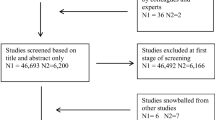Abstract
The aim of this article is to compare the well-being of Dutch children living in different forms of single-parent families and different forms of two-parent families. We found that living in a mother-headed family caused by divorce has a negative influence on children's well-being. However, the effects we found were very small compared to the much larger effects of some other control variables, like parental education. Living in single-parent families or step-families caused by death have less negative effects on children than living in single-parent families or step-families caused by divorce. Our results give some support to the weak social position of the mother as an explanation for the negative effect of single parenthood, while the negative effects of living in a mother-headed family caused by death are larger than those of living in a father-headed family caused by death. Living in a single-parent family does not harm the well-being of boys more or less than that of girls living in the same family form. The negative effects of living in a single-mother family are not strengthened by the low educational level of the mother, nor are they neutralized by the high educational level of the mother. The effects we found in this continental European study are substantially smaller than those found in studies in the U.S.A.
Similar content being viewed by others
References
Allen, Katherine R. (1993). The dispassionate discourse of children's adjustment to divorce.Journal of Marriage and the Family,55, 46–49.
Amato, Paul R. (1993a). Children's adjustment to divorce: Theories, hypotheses, and empirical support.Journal of Marriage and the Family,55, 23–38.
Amato, Paul R. (1993b). Family structure, family process, and family ideology.Journal of Marriage and the Family,55, 50–53.
Amato, Paul R. & Keith, Bruce (1991). Parental divorce and adult well-being: A meta-analysis.Journal of Marriage and the Family,53, 43–58.
Bosman, Rie & Louwes, Wiepke (1982).Eenoudergezin en schoolprestaties (Single-parent families and educational achievement). Groningen: Sociologisch Instituut Rijksuniversiteit Groningen.
Bosman, Rie & Louwes, Wiepke (1984).One-parent family and school achievement. Paper presented at the Second International Interdisciplinary Congress on Women, Vakgroep sociologie, Universiteit van Groningen, Groningen, Netherlands.
Bosman, Rie & Louwes, Wiepke (1988). School careers of children from one-parent and two-parent families. An empirical inquiry into the effects of belonging to a one-parent family on the educational attainment of children.Netherlands' Journal of Sociology,24, 98–116.
Bosman, Rie & Louwes, Wiepke (1989).Gezinssituaties en onderwijskansen. Een toetsing van verklaringen voor de schoolloopbaanverschillen tussen kinderen uit eenoudergezinnen en tweeoudergezinnen (Families and educational achievement. A test of explanations of differences in educational attainment between children from single-parent and two- parent families). Nijmegen: Instituut voor Toegepaste Sociale Wetenschappen.
Cherlin, Andrew J., Furstenberg, Frank F., Chase-Lansdale, P. Lindsay, Kiernan, Kathleen E., Robins, Philip K., Morrison, Donna R. & Teitler, Julien O. (1991). Longitudinal studies of effects of divorce on children in Great Britain and the United States.Science,252, 1386–1389.
Demo, David H. (1993). The relentless search for effects of divorce: Forging new trails or tumbling down the beaten path?Journal of Marriage and the Family,55, 42–45.
Dronkers, Jaap (1994). The changing effects of lone families on the educational attainment of their children in a European welfare state.Sociology 28, 171–192.
Econometrisch Instituut van de Erasmus Universiteit, Nationaal Instituut voor Budgetvoorlichting & Klinische- en gezondheidspsychologie Rijksuniversiteit Leiden (1990).Scholierenonderzoek 1990. Een eerste rapportage van de belangrijkste resultaten (1990 pupils' survey. The first report on the most important results). Den Haag: NIBUD.
Heekerens, Hans-Peter (1987). Toechter geschiedener Muetter: Bildungslaufbahn und Partnerwunsch (Daughter of divorced mothers: Educational attainment and attitudes about partners).Familiendynamiek.
Jencks, Christopher (1992).Rethinking social policy: race, poverty, and the underclass. New York: HarperPerennial.
Kiernan, Kathleen E. (1992). The impact of family disruption in childhood on transitions made in young adult life.Populations Studies,46, 213–234.
Klinische- en gezondheidspsychologie Rijksuniversiteit Leiden, Econometrisch Instituut van de Erasmus Universiteit & Nationaal Instituut voor Budgetvoorlichting (1991).Scholierenonderzoek 1990. Gedrag en gezondheid van scholieren uit het Voortgezet Onderwijs (1990 pupils' survey. Behavior and health of pupils in secondary education). Den Haag: NIBUD.
McNab, Christine & Murray, Asa (1985). Family composition and mathematics achievement.Scandinavian Journal of Educational Research,29, 89–102.
Murray, Asa & Sandqvist, Karin (1990). Father absence and children's achievement from age 13 to 21.Scandinavian Journal of Educational Research,34, 3–28.
Oggenfuss, Felix (1984). Judgendliche aus Scheidungsfamilien (Youth from divorced families).Familiendynamiek.
Author information
Authors and Affiliations
Corresponding author
Additional information
In this article we use the data from the secondary education pupils' survey 1990 conducted by NIBUD (Netherlands' Institute for Budget Research). We wish to thank NIBUD, and especially R. de Zwart, for making these data available. An earlier Dutch version of this paper was presented at the Nationakl Congress of Women/Genderstudies 1993, 28–29 October 1993 in Amsterdam. An earlier English version was presented for the ESF Research Conference on “European Society or European Societies? Life Courses and Social Inequalities,” Schloß Ringberg, Bavaria, Germany, November 22–26, 1993.
Rights and permissions
About this article
Cite this article
Borgers, N., Dronkers, J. & Van Praag, B.M.S. The effects of different forms of two- and single-parent families on the well-being of their children in Dutch secondary education. Social Psychology of Education 1, 147–169 (1996). https://doi.org/10.1007/BF02334730
Received:
Accepted:
Issue Date:
DOI: https://doi.org/10.1007/BF02334730




